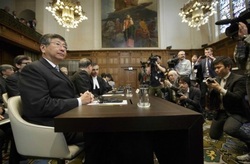 Source: japandailypress.com
Source: japandailypress.com This result and the implications of it led media and foreign affairs analysts in Australia to worry whether the course of FTA negotiations currently underway between Australia and Japan might be derailed by Japan venting its anger about the result through renewed demands on Australia’s FTA negotiators. While Fisheries Minister Yoshimasa Hayashi and Chief Cabinet Secretary Yoshihide Suga expressed ‘deep disappointment’ about the outcome and described it as ‘regrettable’ (J), they also reiterated Japan’s position that it would accept the ICJ’s verdict. Although the verdict does not mean the end to Japan’s whaling program per se, as smaller scale whaling still continues in the North Pacific, it did resolve in one swoop an issue that had clouded Australia-Japan (and for that matter New Zealand) relations since 2010.
As Daniel Flitton noted in the SMH, Tony Abbott never wanted to take Japan to the ICJ in the first place, yet the ICJ’s verdict has essentially cleared the slate for him to negotiate with PM Abe on the FTA without the issue of whaling impeding the otherwise positive relations between both countries. Another area that subsequently came to light through the Australian media on Thursday was the news that PM Abbott would sign a defence and security agreement with Japan during his visit to Tokyo. While the Australian newspaper had reported earlier that Abbott would be selling to Japan an initial 10 Bushmaster armoured vehicles for use by Japan’s special forces ($), the subsequent report on an agreement came as a surprise, but a welcome one at that.
This may be linked to the announcement by the Abe cabinet on Monday that Japan would ease its restrictions on weapons exports, thereby allowing heavy industries such as Kawasaki and Mitsubishi to sell its technology overseas and provide a boost to domestic Japanese industries involved in the production of defence equipment that have been struggling to boost revenue. As has been reported in this blog before, Australia has repeatedly showed its interests in acquiring Kawasaki industry’s diesel submarine engines to replace those in its current fleet of Kockum’s designed subs, and so Monday’s announcement, and the agreement to be signed in Tokyo, may pave the way for Japanese involvement in the Future Submarine program currently being devised in Adelaide.
Expectations are that Abbott’s visit to Tokyo will be the least problematic of his North Asia itinerary, especially in light of Abbott’s past comments on his admiration for Japan and the rapport he appears to enjoy with PM Abe. This rapport, however, may cause some difficulties when he meets with South Korean President Park and Chinese President Xi Jingping. Both leaders may ask Abbott why he considers Japan to be Australia’s ‘best friend in Asia’, and why this same level of courtesy cannot be extended to their countries as well. Abbott may very well reply that Japan has the distinction of being Australia’s largest trading partner for four decades and is a ‘robust’ democracy (points that he repeatedly raises when asked about this in Australia). He may also state that Japan has been a reliable bilateral partner for Australia, neither insisting on historical arguments or making demands, and someone you would want as a partner when instability looms (although he might be a bit more circumspect with his language on this point).
Next week thus promises to be a particularly interesting one from a foreign affairs viewpoint, and will provide markers on how the Australia-Japan relationship will develop over the next three years. Be rest assured that commentators in Australia will be watching PM Abbott’s dialogue with PM Abe closely.
 RSS Feed
RSS Feed